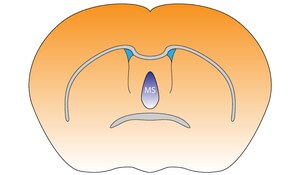Medial septal nucleus
Medial septal nucleus
The medial septal nucleus (MSN) is a critical structure within the brain that plays a significant role in the modulation of hippocampal activity and memory processes. It is part of the septal nuclei, which are located in the forebrain and are involved in various functions related to emotion, learning, and memory.
Anatomy
The medial septal nucleus is situated in the septal area, which is located at the base of the forebrain, near the midline. It is bordered by the lateral septal nucleus and the diagonal band of Broca. The MSN is composed of a heterogeneous population of neurons, including cholinergic, GABAergic, and glutamatergic neurons.
Function
The medial septal nucleus is primarily known for its role in the generation and modulation of theta rhythms in the hippocampus. Theta rhythms are a type of brain wave that is crucial for learning and memory consolidation. The MSN achieves this through its extensive connections with the hippocampus and other parts of the limbic system.
Cholinergic Neurons
The cholinergic neurons in the MSN release acetylcholine, which is essential for cognitive functions such as attention and memory. These neurons project to the hippocampus and cortex, influencing synaptic plasticity and neurotransmission.
GABAergic Neurons
The GABAergic neurons release gamma-aminobutyric acid (GABA), an inhibitory neurotransmitter that helps regulate the excitability of the hippocampus. This regulation is crucial for maintaining the balance between excitation and inhibition in the brain, which is necessary for proper cognitive function.
Glutamatergic Neurons
The glutamatergic neurons release glutamate, an excitatory neurotransmitter that plays a role in synaptic plasticity and neurotransmission. These neurons also project to the hippocampus and other regions, contributing to the modulation of theta rhythms and cognitive processes.
Clinical Significance
Dysfunction in the medial septal nucleus has been implicated in various neurological and psychiatric disorders, including Alzheimer's disease, schizophrenia, and epilepsy. Research suggests that the loss of cholinergic neurons in the MSN is associated with the cognitive decline observed in Alzheimer's disease.
Research
Ongoing research is focused on understanding the precise mechanisms by which the medial septal nucleus influences hippocampal activity and cognitive functions. Studies using animal models and advanced neuroimaging techniques are providing new insights into the role of the MSN in health and disease.
See Also
References
External Links
This article is a neuroanatomy stub. You can help WikiMD by expanding it!
Transform your life with W8MD's budget GLP-1 injections from $125.
W8MD offers a medical weight loss program to lose weight in Philadelphia. Our physician-supervised medical weight loss provides:
- Most insurances accepted or discounted self-pay rates. We will obtain insurance prior authorizations if needed.
- Generic GLP1 weight loss injections from $125 for the starting dose.
- Also offer prescription weight loss medications including Phentermine, Qsymia, Diethylpropion, Contrave etc.
NYC weight loss doctor appointments
Start your NYC weight loss journey today at our NYC medical weight loss and Philadelphia medical weight loss clinics.
- Call 718-946-5500 to lose weight in NYC or for medical weight loss in Philadelphia 215-676-2334.
- Tags:NYC medical weight loss, Philadelphia lose weight Zepbound NYC, Budget GLP1 weight loss injections, Wegovy Philadelphia, Wegovy NYC, Philadelphia medical weight loss, Brookly weight loss and Wegovy NYC
|
WikiMD's Wellness Encyclopedia |
| Let Food Be Thy Medicine Medicine Thy Food - Hippocrates |
Medical Disclaimer: WikiMD is not a substitute for professional medical advice. The information on WikiMD is provided as an information resource only, may be incorrect, outdated or misleading, and is not to be used or relied on for any diagnostic or treatment purposes. Please consult your health care provider before making any healthcare decisions or for guidance about a specific medical condition. WikiMD expressly disclaims responsibility, and shall have no liability, for any damages, loss, injury, or liability whatsoever suffered as a result of your reliance on the information contained in this site. By visiting this site you agree to the foregoing terms and conditions, which may from time to time be changed or supplemented by WikiMD. If you do not agree to the foregoing terms and conditions, you should not enter or use this site. See full disclaimer.
Credits:Most images are courtesy of Wikimedia commons, and templates, categories Wikipedia, licensed under CC BY SA or similar.
Contributors: Prab R. Tumpati, MD

